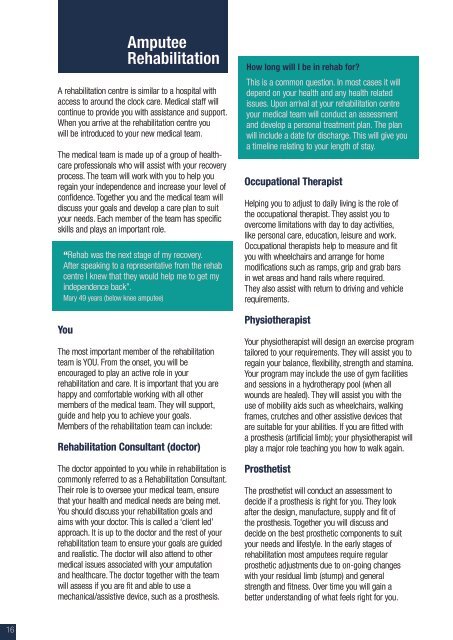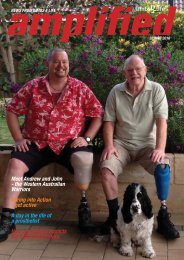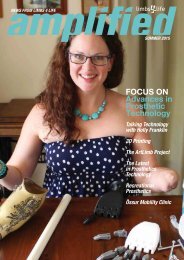A PRACTICAL
A%20Practical%20Guide%20for%20Amputees%20-%20Limbs%204%20Life
A%20Practical%20Guide%20for%20Amputees%20-%20Limbs%204%20Life
You also want an ePaper? Increase the reach of your titles
YUMPU automatically turns print PDFs into web optimized ePapers that Google loves.
A rehabilitation centre is similar to a hospital with<br />
access to around the clock care. Medical staff will<br />
continue to provide you with assistance and support.<br />
When you arrive at the rehabilitation centre you<br />
will be introduced to your new medical team.<br />
The medical team is made up of a group of healthcare<br />
professionals who will assist with your recovery<br />
process. The team will work with you to help you<br />
regain your independence and increase your level of<br />
confidence. Together you and the medical team will<br />
discuss your goals and develop a care plan to suit<br />
your needs. Each member of the team has specific<br />
skills and plays an important role.<br />
You<br />
Amputee<br />
Rehabilitation<br />
“Rehab was the next stage of my recovery.<br />
After speaking to a representative from the rehab<br />
centre I knew that they would help me to get my<br />
independence back”.<br />
Mary 49 years (below knee amputee)<br />
The most important member of the rehabilitation<br />
team is YOU. From the onset, you will be<br />
encouraged to play an active role in your<br />
rehabilitation and care. It is important that you are<br />
happy and comfortable working with all other<br />
members of the medical team. They will support,<br />
guide and help you to achieve your goals.<br />
Members of the rehabilitation team can include:<br />
Rehabilitation Consultant (doctor)<br />
The doctor appointed to you while in rehabilitation is<br />
commonly referred to as a Rehabilitation Consultant.<br />
Their role is to oversee your medical team, ensure<br />
that your health and medical needs are being met.<br />
You should discuss your rehabilitation goals and<br />
aims with your doctor. This is called a ‘client led’<br />
approach. It is up to the doctor and the rest of your<br />
rehabilitation team to ensure your goals are guided<br />
and realistic. The doctor will also attend to other<br />
medical issues associated with your amputation<br />
and healthcare. The doctor together with the team<br />
will assess if you are fit and able to use a<br />
mechanical/assistive device, such as a prosthesis.<br />
How long will I be in rehab for?<br />
This is a common question. In most cases it will<br />
depend on your health and any health related<br />
issues. Upon arrival at your rehabilitation centre<br />
your medical team will conduct an assessment<br />
and develop a personal treatment plan. The plan<br />
will include a date for discharge. This will give you<br />
a timeline relating to your length of stay.<br />
Occupational Therapist<br />
Helping you to adjust to daily living is the role of<br />
the occupational therapist. They assist you to<br />
overcome limitations with day to day activities,<br />
like personal care, education, leisure and work.<br />
Occupational therapists help to measure and fit<br />
you with wheelchairs and arrange for home<br />
modifications such as ramps, grip and grab bars<br />
in wet areas and hand rails where required.<br />
They also assist with return to driving and vehicle<br />
requirements.<br />
Physiotherapist<br />
Your physiotherapist will design an exercise program<br />
tailored to your requirements. They will assist you to<br />
regain your balance, flexibility, strength and stamina.<br />
Your program may include the use of gym facilities<br />
and sessions in a hydrotherapy pool (when all<br />
wounds are healed). They will assist you with the<br />
use of mobility aids such as wheelchairs, walking<br />
frames, crutches and other assistive devices that<br />
are suitable for your abilities. If you are fitted with<br />
a prosthesis (artificial limb); your physiotherapist will<br />
play a major role teaching you how to walk again.<br />
Prosthetist<br />
The prosthetist will conduct an assessment to<br />
decide if a prosthesis is right for you. They look<br />
after the design, manufacture, supply and fit of<br />
the prosthesis. Together you will discuss and<br />
decide on the best prosthetic components to suit<br />
your needs and lifestyle. In the early stages of<br />
rehabilitation most amputees require regular<br />
prosthetic adjustments due to on-going changes<br />
with your residual limb (stump) and general<br />
strength and fitness. Over time you will gain a<br />
better understanding of what feels right for you.<br />
16




